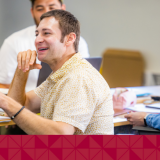
The Road Beyond Your Undergraduate Degree Attallah Alumni Advice
October 5, 2018
What happens after you finish your bachelor’s degree? With so many paths available, it can be overwhelming.
Two Attallah College IES (Integrated Educational Studies) alumni have agreed to share their stories:
- Emma Colapinto ’18, IES major (Schools Emphasis) with minors in Disability Studies and Language & Literacy, is currently enrolled in the Education and Human Development Master’s Program at the University of Colorado Denver. She is pursuing a dual master’s degree in elementary and special education.
- Alexa Abadee ’18, IES major (Community Emphasis) with minors in Psychology and Disability Studies, is currently enrolled in Chapman’s Communication Sciences and Disorders Post-Baccalaureate Certificate Program. She aspires to be a speech language pathologist.
Emma and Alexa explain how and why they chose their graduate programs and give some great advice for those not sure what to do next.
Right to Graduate School, Emma Colapinto ’18
How did you choose a graduate school?

Emma Colapinto ’18
I’m originally from Colorado and knew that I wanted to move back after completing undergrad, so location was obviously a priority. As much as I would have loved to stay at Chapman, I knew that Colorado is where I see myself teaching and living. I started looking at graduate programs for education and talking with people I knew who had attended graduate school in Colorado. I applied to two schools that have great programs and are close to my house so I could commute. I interviewed and got into both schools and, from there, decided to attend the University of Colorado Denver. The main reason I chose that school is because its special education program is established and has a good reputation. I decided my senior year of undergrad that I wanted to pursue special education, so that was a huge factor when looking at schools.
When applying for grad school, always keep your options open and don’t close yourself off to schools until you learn more about them. Do your research, ask questions, and find the program that fits what you want.
Should you go straight to grad school or get some work experience first?
I think it really depends on the person. For me, I had to go straight into graduate school because I knew I wouldn’t want to go back to school after taking some time off. It was hard enough to go back after graduation and summer break! I think it was a little easier to jump straight into graduate school because I was still fresh off the school mode.
But I really think it depends on the person; there really isn’t a right or wrong way. You have to think realistically about your future and what the path looks like. Taking time off is fine—undergrad is an intense time in your life, so taking time to breathe and figure things out is understandable. Not going to graduate school is also fine—work experience is only going to benefit you in the field. I would say do what is best for yourself, and don’t feel like you have to follow what other people are doing. It’s ultimately your future, so you need to decide how you want to live it!
First Extended Education, Alexa Abadee ’18
Why did you choose to pursue an extended education program rather than graduate school? What are some of the key differences?

Alexa Abadee ’18
I didn’t really have much of a choice when it came to entering an extended education program. Because I majored in IES, which is a major outside of communication disorders (the field of speech-language pathology), I had to take the leveling courses, or prerequisites, to give me a foundation in the discipline. That is what the post baccalaureate (post-bac) program is allowing me to do.
How did you research various programs? What was your application process like?
I found programs that offered the post-bac and took a number of factors into consideration including cost, length of the program, and hours. I love Chapman’s post-bac program because it’s only 10 months, whereas all other programs I looked at were two years. The classes are on Friday evenings and all day Saturday, so I’m able to work during the week.
In terms of the application process, I had to see what each school required. CSUF (California State University, Fullerton) required the CBEST, while other schools did not, so I had to take that prior to applying. For some schools, I had to write a personal statement, submit letters of recommendation, and do an in-person interview. I was accepted into all four programs I applied to.
How did you know you wanted to go straight into a higher education program instead of joining the workforce first?
I am aspiring to be a speech-language pathologist, and the profession requires a master’s degree to be able to practice. Because I have to spend an extra year doing the post-bac, and then spend two or three years in a master’s program, putting off grad school was not something I wanted to do. I would rather buckle down the next few years and be able to practice the career I am most passionate about than wait and be stuck in a job I’m not completely fulfilled with.
Excerpt from the Attallah College Undergraduate Student Newsletter.

